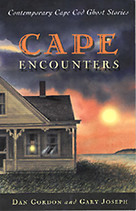Author Michael Bell Reviews "Cape Encounters"
As the authors write in their introduction, they wanted to include "the human element" in the stories they collected. What a refreshing change from the usual collection of ghost stories, where the ghost is the star and the people who share a time and place with them mere props. It is, after all, the experiences of the people, as reported by the people, that provide whatever link exists between the rational world and the world beyond. Holding to this approach throughout the book, the authors introduce each story with a brief contextualization and scene-setting, then allow their tellers to relate the stories in their own words, with an occasional interlaced description. I like that the authors are, at the same time, skeptical and accepting. Collectors of ghost stories too often are overly enthusiastic about accepting the supernatural origins of any phenomena they report on. On the opposite end are the writers who refuse to accept at face value the experiences reported to them, assuming that such beliefs have no factual or rational basis, but are, in effect, merely artifacts of a belief system. According to some contemporary folklorists, however, there are certain "core experiences," including haunted houses, near-death experiences, miraculous healing, and consoling visits by the deceased to the grieving, that seem to crosscut cultural interpretation. Which may help explain why the phenomena that the storytellers describe in Cape Encounters are found in ghost stories the world over: footsteps, closing and opening doors, odors, icy chills, rearranged objects, voices and, of course, visual encounters. In their readable and entertaining book, Dan Gordon and Gary Joseph show that it is possible to grant reasonableness to a belief without accepting it as true or verified. In so doing, they respect both readers and narrators by leaving open new possibilities for interpreting phenomena long held to be eccentric, abnormal, or irrational.



